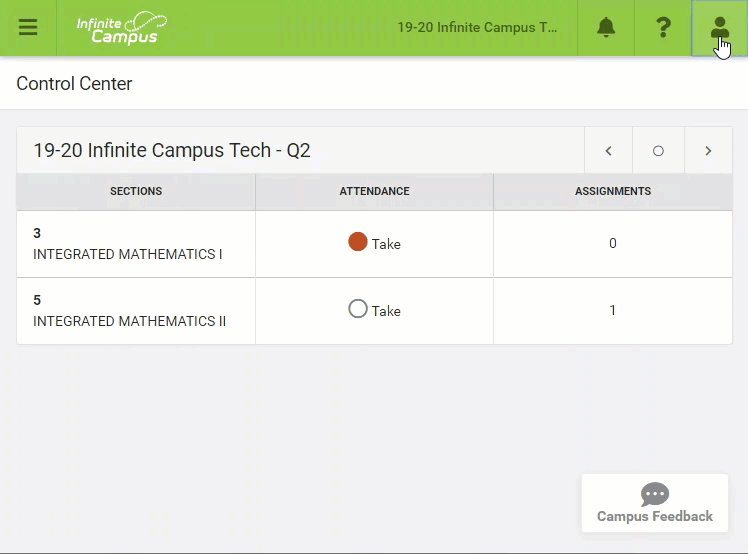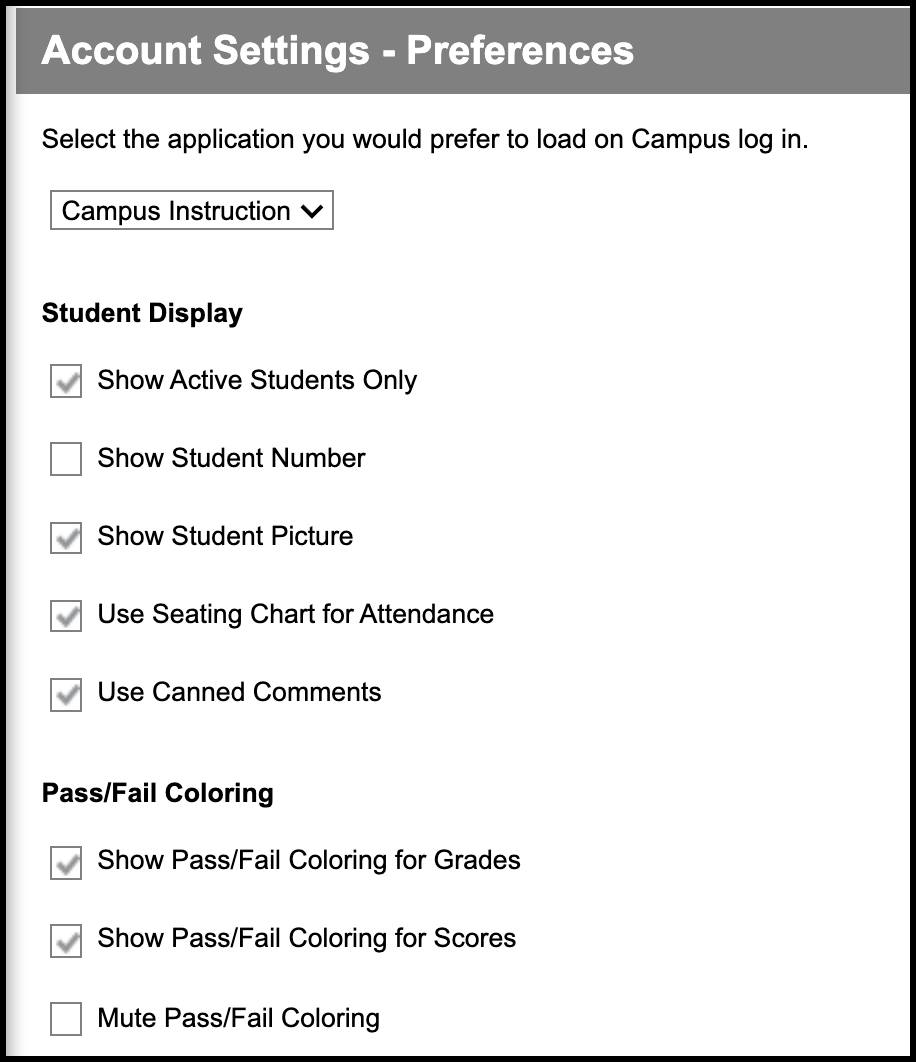Here is a brief overview for using the Infinite Campus Grade Book for CCS Teachers. For helpful videos and documentation that is more in depth, please visit Campus Community. Instructions on how to access Campus Community and other helpful tools can be found on the Campus Support page.
Log in:
Go to www.ccsoh.us and select Staff then the Infinite Campus link. Use the same username and password as your email. Every time you change your login it will change for Infinite Campus as well.
- Click on the App Switcher (looks like 9 little boxes) and select Campus Instruction. If there is not a Grade Book link on the left side of your screen you are in Campus Tools, and not Campus Instruction. You can change this in settings so that you are automatically directed to Campus Instruction when you log in.
- You will also see an option here that says Campus Community; if you select this you have access to news, forums where you can search or post a specific question, and also the knowledge base, which includes videos, tutorials and virtual labs.
In the top right verify the current year and school. The log off button is also in the top right of the screen.
Set Preferences
Before proceeding, it is a good practice to create your account preferences. This only has to be done once. However, these options can be changed at any time throughout the school year.
Grade Book Settings and Preferences
- +Add Create a new Assignment
- Sort
- Filter
Set Preferences
Before proceeding, it is a good practice to create your account preferences. These options can be changed at any time throughout the school year.
Grade Book Selections
- Select the Current Term (Q1, Q2, Q3, Q4)
- Select the Section (Class) you want to work with.
- Select the Task (Quarter, Interim, Exam or Final)
| Note |
|---|
The task for Exam and Final will only appear in Terms they can be entered. For a full year course, the Exam and Final tasks will appear when Q4 is selected. |
The following Options are available for each class section.
+ Add - Click this button to create an Assignment for the Section selected
Sort - The Sort Button allows you to change the order of the assignment in the section.
Filter - The Filter Button allows you to hide and show Student or Assignment specific criteria.
Grade Book Settings
| Panel | ||
|---|---|---|
| ||
The Settings tab of the Grade Book includes tools used in Grade Book setup, a variety of options for displaying student scores in ways that can help teachers focus on student performance, and other Grade Book display preferences. Use ALT G to expand and collapse the settings menu. The context of the Grade Book is determined by the options selected in the Campus toolbar and the Term, Section and Task dropdown lists above the Grade Book. The Grade Book remembers where you were and opens to the same Term, Section and Task as your last visit. |
Assignment Defaults
| Panel | ||
|---|---|---|
| ||
Assignment Defaults allow teachers to create templates for assignments, with options for Section Groups, Date, Grading Setup, and other assignment elements. Defaults help teachers save time when creating assignments with options that they use often. A teacher can have multiple defaults set. One default can be set to apply automatically whenever assignments are created. |
Assignment Marks
| Panel | ||
|---|---|---|
| ||
Assignment marks allow teachers to create their own grading thresholds, which convert scores entered into percents. Assignment marks are applied to a single assignment at a time. This tool could be useful in instances when you want to create a custom set of scores for an assignment that should have a numeric effect on student score. Teachers also have access to sets of Marks created by their district. Ownership of marks is indicated in the list. For example, an art teacher may want to score projects with a letter grade rather than a point value. The assignment marks would then convert that letter grade into a numeric percentage for grade calculation. |
Categories
| Panel | ||
|---|---|---|
| ||
Categories are like the folders that assignments are sorted into, collecting related assignments. |
![]() Categories must exist before you can create assignments.
Categories must exist before you can create assignments.
Grade Book - Categories
Assignment List
| Panel | ||
|---|---|---|
| ||
View a list of all assignments in the class selected in the Grade Book. |
Grade Book - Assignments
Filter Defaults
| Panel | ||
|---|---|---|
| ||
Filtering options determine which students and/or assignments display in the Grade Book. Sorting options change the order in which assignments display in the Grade Book. Additionally, each column in the Grade Book has double arrows in the header, which can be used to sort the Grade Book by that column (alphabetically by student name or numerically by score or grade). |
Grade Calc Options
| Panel | ||
|---|---|---|
| ||
The grade calculation options are the preferences you select to determine how the Grade Book calculates In Progress grades and proficiency estimates.
|
![]() Grade Calc Options must exist for In Progress grades to be calculated.
Grade Calc Options must exist for In Progress grades to be calculated.
![]() Grade Calc Options must be set for each course section.
Grade Calc Options must be set for each course section.
Grade Book - Grade Calc Options
Grading Scales
| Panel | ||
|---|---|---|
| ||
Grading scales translate In Progress percentages into letter grades. Scales describe the range of score percentages that earn specific grades. The grading scales list includes all scales you've created and all district scales, regardless of the Year or School selected in the Campus toolbar. The district may provide all the grading scales you'd like to use, but you could create your own scales if, for example, you wanted a more rigorous scale for an advanced class that required a higher percentage to earn a standard grade letter. |
Section Groups
| Panel | ||
|---|---|---|
| ||
Section Groups allow a teacher to group similar sections together in a single grade book view. Groups make scoring assignments easier by combining matching assignments into shared columns in the grade book. |
Selected groups apply to the grade book view only. However, all calculations and graphs (for Traditional Grading and Standards-Based) presented in the grade book view do cover all students in a section group |
. |
- Help: More information about Box and Whisker diagrams, etc.
- Web Site Address: Communicate a web site for your course through the Portal.
Helpful Tips
Never log into Infinite Campus more than once IN THE SAME BROWSER!
If you cannot see all of your classes, or students in your class, try the following:
- Check the year at the top of the Infinite Campus page
- Check the school at the top of the Infinite Campus page
- Log out of Infinite Campus, then back in
- Try using a different internet browser
- If you are using a tablet or other mobile device, log into Infinite Campus using a computer
- Try clearing the browser cache
| Warning | ||
|---|---|---|
| ||
If all students are not |
in the correct section, or students display who are not in your class, notify your school scheduler as soon as possible. Do not wait until the last day or two of the open grading window to enter grades. Allow time to resolve any issues that may occur. |






